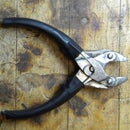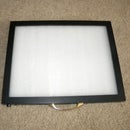Introduction: How to Make Pierce Work Jewelry
This is how to make jewelry items out of sheet metal with decorative holes. I will show you how to make a pin with the piece I cut out. There is almost no limit to what you can make with enough thought behind this process.
Step 1: Gather Materials
I am using a .80mm thick plate of sterling silver to demonstrate. I will be cutting out a rose design. I will be making this into a pin so I will need the clasp, hinge, & pin parts as well. I am also going to add color epoxy to this later on, you don’t need to do that. I will talk about finishes & other options later. Last but in no way least you need a design to cut out. I went to Google & looked for line art flowers to get my design.
Step 2: Gather the Tools.
A good saw frame, with metal cutting blades. Flex shaft or other rotary tool. Drill bits. Polishing wheels. Glue. Saw blade wax/lube.
Step 3: Putting the Pattern on the Metal.
Make sure your metal is clean, then glue your pattern on to the sheet metal. Let this fully cure, depending on the glue's directions. I use Elmer’s for this. Not always the best hold but it usually works long enough for my needs.
Step 4: Holes for Saw Blade.
Drill a hole in each of the desired cut out spots. This needs to be large enough for the blade you are sawing with. Be careful not to get too close to the edge of the design.
Step 5: Cutting the Outer Shape.
I started by cutting the outside of the piece. Make sure you cut as close to the outside of the line as possible without going into it. You can always go back over it with a file to sure it up if needed. It is much harder to add material than to take away. Save all that you cut away, if not for reuse than scrap recycling. The largest piece that came off, I can use as the base of a bezel. I start with the outer shape so that I am removing the larger sections before the sheet gets too delicate.
Step 6: Putting the Saw Blade in the Holes.
In order to cut out the design you need to put the saw blade inside the holes drilled earlier. Tighten the blade as you would normally. Keep your blade lubed up, the more you can the blade lubed the less likely the blade will bind/brake. (forgot to take a pic of that. Found one online)
Step 7: Cutting the Inner Shapes.
I will cut the inside holes from one side of the piece to the other. Using the bench pin to support the sheet as you cut, saw each hole along the inside of the lines this time. Again saw as close as you can without cutting into the lines. As you cut away material the piece will become more delicate. Depending on the design, thickness of material, & how well the piece is supported will determine how delicate the piece is overall. When all done take the paper off. (I used some painters tape to show some contrast to show what was cut out.)
Step 8: All Cut Out, Now What?
Depending on your design, & how you cut it out, you can make a wide range of jewelry items with this. If you add a small strip to the design before cutting you can curl it around to make a bail for a pendant. Have 2 strips & curl the whole piece to make a ring. I decided I wanted to make a pin. I could have added the pin parts to the plate “as is” once it was cut out & had a very nice piece. I wanted to add some color, so I soldered what I cut out onto another piece of sheet. I had to re cut out the outside shape, & file to match.
Step 9: Solder on Your Components.
As stated before anything after the piece is cut out is optional. Flip the piece face down & place the hinge at one of the two furthest points. Once that is in place, you can put in the pin loosely so you can adjust where the clasp ends up. Solder that at the other furthest point. I like to do this with the pin in. This way I know for sure that it will stay lined up. Trim the pin down for length.
Step 10: Polishing.
I find that I like the polished look the best for a lot of things. You could put any texture on that you want. I find that the difference in the textures from the bottom of the “holes” lends well to having a polished top surface.
Step 11: Color Fill.
I used a two part Colores Gem-Tone Transparent Epoxy Resin to color the pin. I had to thin out the color a little bit, other wise it would be too dark. I used the ruby, & emerald colors. Be careful how you apply the epoxy, you don’t want to have to wipe it away which can cause streaking. Don’t over fill either, I will need to grind some of the green off the leaf.
Step 12: That Should Be It.
You can make so many things with this technique. A very impressive way of making jewelry that you could do without too many tools, & many different skill levels for everyone. (More pictures found online)





